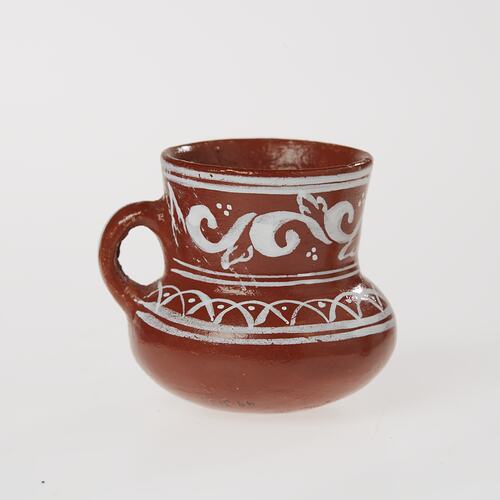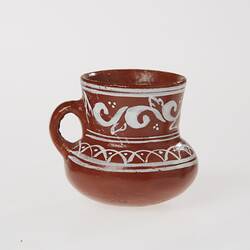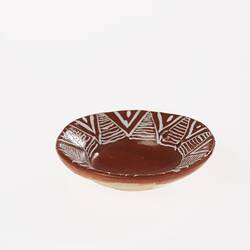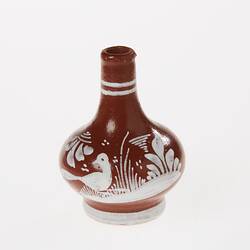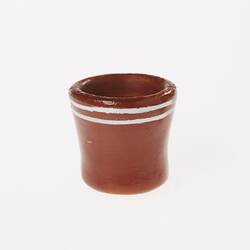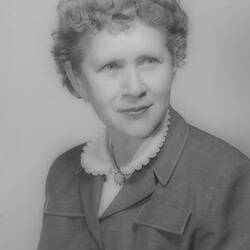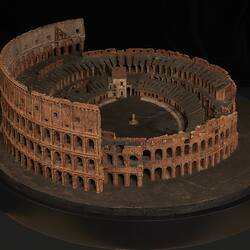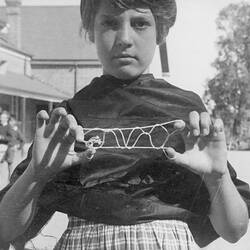Summary
Alternative Name(s): Miniature Dishes
Set of four miniature brown ceramic toy dishes with white pattern markings. Made by Senor Munoz, Senora Carmon Martiniano Munoz, Senor Martiniano (her father) & Pedro Munoz, aged 12, Tonala, Mexico, 1963. One of a group of toys made by members of the Munoz family in Tonala, Mexico. In this ancient 'pueblo', each home is a pottery factory where the families have made the same type of pottery for many generations. Dishes like these are also used by adults in social rituals among merchants on public market days in Mexico.
Collected by American folklorist Dr Dorothy Howard. In 1962-63, during sabbatical leave, Dr Howard undertook research in Tonala. She had for many years been keen to study a single child intensively in the context of his family and community, and collect play materials from the local community. She choose to study Pedro Munoz, who was 12 years old in 1962. She published a book based her research, Pedro of Tonalá, in 1989. In later years she studied a girl from ages two to four in Lincoln, Nebraska (1967-1969), and in 1977 published a detailed account of her own childhood in Dorothy's World: Childhood in Sabine Bottom, 1902-1910.
This set is part of the Dorothy Howard Collection. Dr Howard visited Australia as a Fulbright fellow in 1954-55 to document and research the folklore of Australian children, and established an on-going research connection with Australia, particularly through Dr June Factor. The Collection primarily contains documents, photographs and objects from Australia and the United States. It is now contained with the Australian Children's Folklore Collection (ACFC), unique in Australia, documenting contemporary children's folklore across Australia and in other countries reaching back to the 1870s. The Collection has a strong component of research material relating to Victoria.
Physical Description
Set of four miniature brown ceramic toy dishes with white pattern markings. One flat bowl with white pattern around the rim, one utensil jar with two white rings around the rim, one vase with white bird decoration and one urn with handle and white pattern. Pieces are stored in a white cardboard box.
Significance
The making of ceramic pottery is a tradition handed down through generations of Mexican families. In Tonala, an ancient pueblo fifteen miles from Guadalajara, families have made pottery for generations.
At the time these dishes were made, Pedro, the oldest son, was an apprentice who, one day, would head the family pottery factory. They are an example of the link between family and cultural traditions, and how a family craft is passed on to each succeeding generation. The whole set of dishes represents the craft of three generations of the one family.
More Information
-
Collection Names
Australian Children's Folklore Collection, Dorothy Howard Collection
-
Collecting Areas
Leisure, Home & Community, Childhood, Migration & Cultural Diversity
-
Acquisition Information
Cultural Gifts Donation from Dr June Factor, 18 May 1999
-
Acknowledgement
Donated through the Australian Government's Cultural Gifts Program.
-
Maker
-
Classification
-
Category
-
Discipline
-
Type of item
-
overall dimensions
25 cm (Length), 22 cm (Width), 5.1 cm (Height)
Dimensions are for the storage box. Tallest piece stands 5.3cm high.
-
References
TASP Newsletter, vol.7, no.3, Spring 1981 - containing articles about and by Dorothy Howard, including information on her Mexican research. Dorothy Howard, 1989, Pedro of Tonalá.
-
Keywords
Ceramics, Cultural Traditions, Handmade Games & Toys, Rituals, Toys
